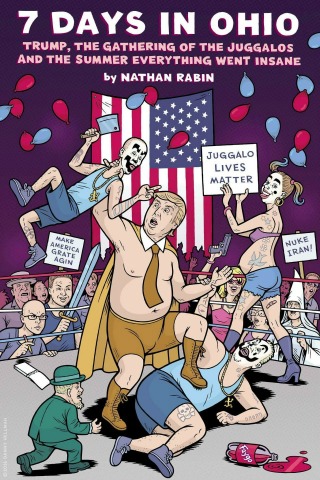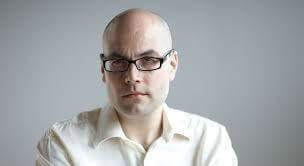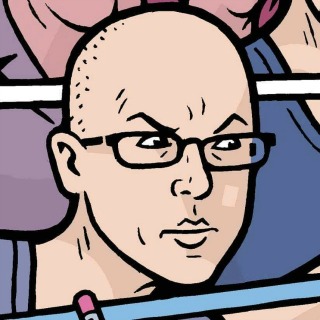Nathan Rabin Talks Trump, Juggalos And Leaving Chicago
By Chicagoist_Guest in Arts & Entertainment on Sep 13, 2016 3:21PM
By Max Kyburz
 When I ask Nathan Rabin—husband, father, ardent Juggalo defender and former head writer of The A.V. Club—what he misses about his bygone homeland in Chicago, he answers sweetly and simply: "my elderly father." His father’s battle with multiple sclerosis, which stretches back to Nathan’s childhood, has led a shuffling through of multiple nursing homes. "I am in that wonderful stage in my life," Rabin says over the phone, "I am middle-aged, taking care of a baby, and also sorta taking care of a parent as well."
When I ask Nathan Rabin—husband, father, ardent Juggalo defender and former head writer of The A.V. Club—what he misses about his bygone homeland in Chicago, he answers sweetly and simply: "my elderly father." His father’s battle with multiple sclerosis, which stretches back to Nathan’s childhood, has led a shuffling through of multiple nursing homes. "I am in that wonderful stage in my life," Rabin says over the phone, "I am middle-aged, taking care of a baby, and also sorta taking care of a parent as well."
Having lived in Marietta, Georgia for about a year now, Rabin vouches this as currently one of the few positive connections he retains with Chicago. It’s the city where he grew up, began grappling with anxiety and depression—“I am a neurotic motherfucker,” he self-diagnoses—and found a career celebrating pop culture. Since becoming an A.V. Club film critic in 1996, Rabin’s reach has widened, his enthusiasm for Phish and Insane Clown Posse eventually equalling levels held for Godard and The Simpsons. His latest Kindle book, 7 Days In Ohio: Trump, The Gathering of the Juggalos And The Summer Everything Went Insane, which was released on Tuesday, finds Rabin seeking solace in ICP’s Dark Carnival from an angrier, more misogynistic dark carnival: the Republican National Convention.
As his best known works explore the downtrodden and outright failed, it would be more convenient to label his debt-laden departure from Chicago into the wilderness of freelance as such. However, considering the present state is a far healthier and happier one than he's seen in even his glitzier days, it's better to argue that Rabin falls under the highest grade deployed in his celebrated column "My World of Flops: A Secret Success."
Rabin, born in Chicago in 1976, endured a childhood he's described as tragicomic. At age two, he was kidnapped by his mother and taken through Missouri, Texas and California before being recovered by a bounty hunter of sorts hired by his father. He would not see her again until his early twenties. Instead, he was raised alongside his older sister by a long-suffering father before eventually bouncing from mental hospital to foster home to group home—eventually falling into the warm arms of global pop-culture geekery, all of which he chronicles in his memoir The Big Rewind.
Looking back upon an autobiography he wrote at thirty-three, Rabin experiences a fair share of surprise and embarrassment, particularly at his turns of phrase: “My thinking was ‘I have a really depressing story, and I need to make it really funny and light and jokey, or they’ll reject me.’” Nevertheless, "The Big Rewind" remains a crisply entertaining volume. Be it a scorn-filled showbiz anecdote about the sinking ship of televised film criticism or a horrendous breakup that tops the previous horrendous breakup, Rabin’s humor anchors it all, even as he finds those events more trivial now. “Things that seem important you at the time don’t seem important at all ten years later; you found you were writing about something so petty and small.”
Eventually, Rabin would take upon more meaningful and personal work; as My Year of Flops expanded into its fourth year, Rabin found not one but two major projects that would help define where he's at now. One is The Weird Al Book, a deliciously vivid coffee table book—Rabin's biggest seller to date—that was awarded to him by the Weird One himself via Twitter. He came to that project amidst the long, tumultuous process of crafting "You Don’t Know Me But You Don't Like Me," a gonzo travel journal following the exploits of ICP’s and Phish’s reviled fanbases into the condescendingly-perceived “wastelands” of drug-fueled music festivals. He opens the story with how his then- girlfriend and now wife Danya was instrumental in his appreciation of both camps. It is through this process that he becomes engaged not only to Danya but to the subcultures he initially shunned. While a project of tremendous personal growth, the other shoe was not far behind; Rabin ended up in tremendous debt and faced a lawsuit from American Express.
 The news that he’d be leaving his career-long stint at The A.V. Club shocked many, but it was out of no ill will. He joined fellow ex-Clubbers Keith Phipps, Scott Tobias and Genevieve Koski at The Dissolve, a Pitchfork-produced site that produced some of the best film criticism in recent memory. However, economics reared its ugly head, forcing the site to shutter in July of last year, just two days before it would celebrate its second year. Rabin left in April, prompting him and his family to move into his in-laws' basement in August. But rather than continue to be bitter about the cards he’s been dealt, he tells me he’s found peace:
The news that he’d be leaving his career-long stint at The A.V. Club shocked many, but it was out of no ill will. He joined fellow ex-Clubbers Keith Phipps, Scott Tobias and Genevieve Koski at The Dissolve, a Pitchfork-produced site that produced some of the best film criticism in recent memory. However, economics reared its ugly head, forcing the site to shutter in July of last year, just two days before it would celebrate its second year. Rabin left in April, prompting him and his family to move into his in-laws' basement in August. But rather than continue to be bitter about the cards he’s been dealt, he tells me he’s found peace:
“I went through life going ‘I’ll always be a film critic, always be a staff writer, working in these great organizations with the same group of people.’ Over the last two years, all of those convictions have been challenged, or I just lost them. That’s the wonderful thing about life—you do a bunch of shit, then you realize how little of it you actually need. There’s definitely parts of my old life that I miss, but on the whole I’m so much happier now.”
Though he misses Chicago, he would not mind having fewer connections to it. “I had a really good run and I felt really passionately about Chicago,” he says, “but I kinda lost that over the last two years or so.” Any major city has its warts—racism, violence, weather, you name it—all of which Nathan punctuated with an optimistic “but.” But with his son Declan in the picture, his outlook began to change: “I want him to think that life isn’t unbearably hard, and you just accept the difficult things, because that is what life is all about when you’re a Midwesterner.” Rabin still speaks highly of Albany Park and of the literary, musical and comedic traditions that come from Chicago, which he hopes will gleam brighter for him in the future. The heartache of leaving still with him, Rabin is still trying to retain a comprehensive faith about his old stomping grounds.
He’s also gotten over his fear of rejection. “As a freelancer,” he says, “you face a lot of rejection.” Aside from writing film-related columns for the likes of TCM and Rotten Tomatoes (as well as continuing My World of Flops for AV Club), many of Rabin’s offscreen revelations have been journaled for Mom.me, where he serves as the token father on a blog written for mothers. He even wrote about how, yes, Juggalos really bring their kids to the annual Gathering. It’s the most “Nathan Rabin” of the blogs he’s written for the site, not strictly in how it handles pop culture, but also because he’s developed an unironic and protective affection for all things ICP-related since 2011. Since writing "You Don’t Know Me," he’s returned to the Gathering numerous times, growing more and more connected with the maligned group (preposterously on an FBI list for gang activity) each time.
 Though he initially attended sporting the voyeuristic tendencies many outsiders have coming into the Gathering, Rabin has seen the festival grow more family friendly, even making that angle a focus of his A.V. Club coverage last year. At the most recent Gathering, he took it to heart by reuniting with his thirty-seven year old half-brother for the weekend. “It’s a very strange thing,” Rabin says, “to spend your first couple days with your brother when you’re forty years old, and at the Gathering of the Juggalos.” Of course, he needed to write about it, but after being rejected by various major publications, he decided that, again, the only way to get what he needed was to conquer a fear.
Though he initially attended sporting the voyeuristic tendencies many outsiders have coming into the Gathering, Rabin has seen the festival grow more family friendly, even making that angle a focus of his A.V. Club coverage last year. At the most recent Gathering, he took it to heart by reuniting with his thirty-seven year old half-brother for the weekend. “It’s a very strange thing,” Rabin says, “to spend your first couple days with your brother when you’re forty years old, and at the Gathering of the Juggalos.” Of course, he needed to write about it, but after being rejected by various major publications, he decided that, again, the only way to get what he needed was to conquer a fear.
“I always felt weird about asking for things, being self-conscious of a desperate energy,” Rabin says, which is why it took him several days before initiating a GoFundMe campaign to back the trip to the Gathering in Legend Valley, Ohio, and also the Republican National Convention in Cleveland, which was within reasonable travel distance. Sure enough, his loyal cult following—most fervent in a Facebook group called Society For The Toleration of Nathan Rabin—and allies pulled through, raising over $5,500, covering not only expenses but also a new computer and a down payment on a new condo for his family. Since missing a chance to see Phish at the Hollywood Bowl with comedian Scott Aukerman and the late comic's comic Harris Wittels, Rabin knew he couldn’t miss out on any more once-in-a-lifetime opportunities.
For the first time in his career, after four books and countless articles, Rabin is self-publishing under Declan-Haven Books. 7 Days In Ohio expands upon his polar opposite feelings endured during these two events. The safety and camaraderie he felt at the Gathering—“the Dark Carnival provides, and everything ended up working out well”—was the antidote to the fear he endured at the RNC, which he likened to Nazi Germany.
The arena housing the Trumpalos was a haven for weaponized grief and inflamed misogyny. Despite the Juggalos’ own troubled history with misogyny and violent behavior (a Gathering involving urine-filled bottles flung at Tila Tequila being most infamous), this year’s stance was about uniting in peaceful rebellion, not about demanding an opposing politician’s blood. The similarities between the two events is only skin-deep; while Rabin's RNC depicted the world as a blistering hellhole, he suggests that ICP “argued that the world was already wonderful and filled with joy and it could only get better if people would come together.”
Rabin’s journey with the Juggalos hasn’t stopped. He even expresses desires to cover next year’s Juggalo Day Weekend in Canada, and he will be marching alongside his fellow Faygo drinkers when they march on Washington next year. He says he left the last Gathering declaring, “I’m going to this until I die, or until I’m unable to do it.” Even if he’s not part of the demographic, he recognizes the value in underdogs, being one himself.
Nathan Rabin's 7 Days in Ohio is available for purchase here.